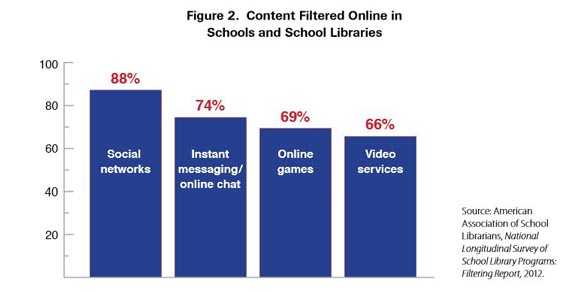Banned Books Week and Banned Websites Awareness Day only come around once a year, but for students, learning is affected all year long by the content they are able or not able to access. A report by ALA, Fencing Out Knowledge: Impact of CIPA 10 Years Later, seeks to understand the long-term impact of the law requiring filtering software on school computers, and some of its unintended consequences as revealed through existing research and ALA’s own interviews and symposium.
The Children’s Internet Protection Act (CIPA) was passed in 2000 with the intention of blocking obscene and pornographic images from school computers. So why does ALA consider it a problem? While there is good reason to prevent children from viewing certain content, ALA argues that much of this filtering is not very effective and needs to be revised.
In fact, software filters are reportedly so unreliable that they over-block useful content or under-block obscene content 15-20% of the time. But the main takeaway from ALA’s report is that CIPA disproportionately impacts already disadvantaged students, giving those who get unfiltered access at home an advantage over those who only have filtered access at school. In a Pew study of AP and National Writing Project teachers, nearly half (48%) of the respondents in urban areas and/or teaching low-income students responded that filtering had a major impact on the effectiveness of student learning. And while much of the filtered content (as shown in the above graph) appears to be entertainment, the fact is that for young people, online platforms such as games, videos, and social networks are a becoming a major component of learning and the establishment of early digital literacy.
ALA argues that school librarians have the ability to promote and teach the ethical and safe use of information technologies, and urges that schools should make better use of them to train teachers to assess the quality of online sources and to collect valuable resources for student use. CIPA is likely here to stay, but school librarians are well positioned to mitigate any negative effects it may have on student learning.
ALA also looked at the effects of CIPA on public libraries. Check out the full report here.
Note: This post is part of our series, “The Weekly Number.” In this series, we highlight statistics that help tell the story of the 21st-century library.
